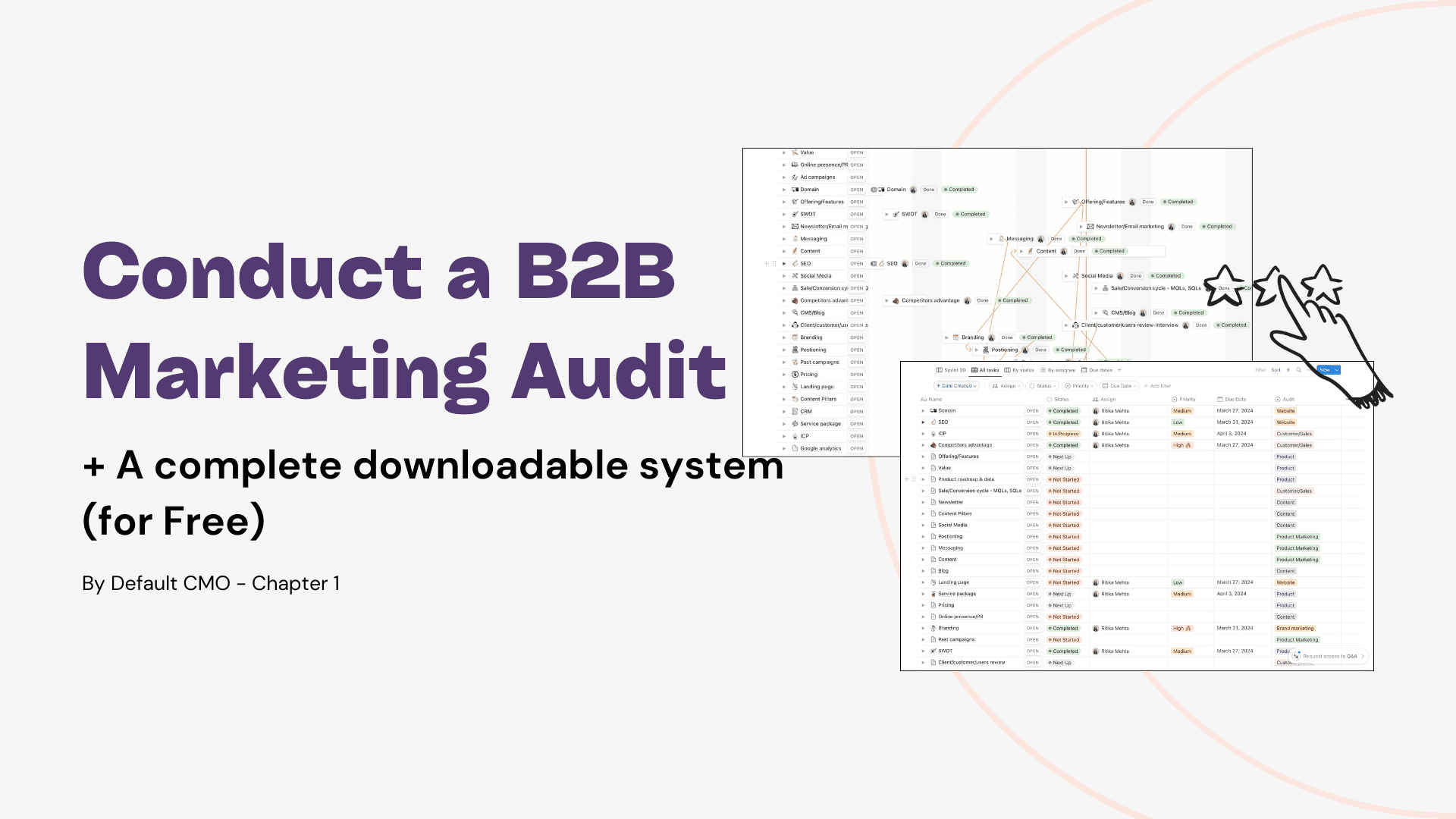Marketing audit guide
Friday, May 17, 2024

One of the most common reasons why B2B companies struggle with growth or are stuck at a certain ARR is not having marketing and business goals aligned.
Lack of communication, board product positioning, unclearly defined integrated strategy to execute upon, and undefined target segment or ICP leads to off-brand messaging and a disparate customer experience.
When marketing and business think about these elements differently, growth grinds.
Why do you need a marketing audit?
For marketing to influence your product and customers, it’s important to understand the business and its goals first. If one of these things doesn’t align, it’s time for you to conduct a marketing audit:
If you have unclear goals, OKRs
Missed product positioning or messaging
Don’t have a defined or clear ideal customer profile
Too broad or narrow target audience
Unclear marketing priorities
Trying everything but still don’t see much growth
Haven’t reached product-market fit
Not-so-strong brand image
Bringing alignment in the above aspects of your marketing strategy and company objective is vital. When you don’t have the right direction to begin with, start with a marketing audit.
This brings us to the purpose of conducting a B2B marketing audit
Accessing the current state of marketing function can often be the hardest. Given the broad nature of marketing, the impact of current and future success typically depends on various factors.
But if done correctly it will help access the company’s capabilities, weaknesses, strengths and opportunities that lie within the marketing strategy. Keep an open-ended approach and make sure you have answers to these high-level questions:
Do you have clarity on what you're offering, to whom and how?
Where has the company found its marketing success and how effective it is?
Where marketing isn’t working or showing good results - struggling to get more active customers from Channel X, how can it be increased?
Where are the opportunities for growth, including low-hanging fruits?
Are there any clear channels that are providing above-average returns? How can it improve the CAC for channel Y?
Is there room for additional marketing investment or improvements?
Where does the company stand from a product market fit perspective? Understand if customers see the product the way you want them to.
Do we have clear goals, and OKRs and what actions have been taken to get closer to it?
Is the content able to convert leads or book demos, if not, then what can be done to improve it?
Do we have all the necessary materials to support marketing activities?
These questions are just 10% of what you’ll uncover while conducting a marketing audit.
TL;DR: This audit isn’t just focused on data or analytics, it runs through dashboards, funnels, automation flow, frameworks and long & short-term strategy with a detailed understanding of customer journey funnel: awareness, lead, MQL/SQL, conversion, customer, retention/referral.
How to conduct a marketing audit?
It’s a common misconception that a marketing audit is a lengthy and comprehensive process which requires tons of data to develop an actionable report. But early-stage startups can begin with what they have and experiment to find a path.
A note to remember: depending on the size of the business, it’s good to measure certain things quarterly and keep the complete marketing audit for once every 6 to 12 months. But a very early-stage startup can conduct it when needed. Anytime you feel like you’re stuck somewhere or things aren’t moving forward conduct a marketing audit.
Here’s an example along with a template for you to conduct your own.
Download it and use it along with the complete guide that consists of 5 chapters in detail on how to conduct a b2b marketing audit.
This Marketing Audit System was created after auditing many early-stage and growth-stage startups which has led to key insights that otherwise would have been missed.
You can get along with different team members and stakeholders responsible for making leadership decisions.
Product audit
A great product isn’t successful without a great marketing strategy and a great marketing strategy isn’t successful without a great product. You have to make sure the product is compatible and ready for marketing.
Try the product and map the user journey to learn about its benefits, values and features - define the experience it brings.
What’s the product and what’s it for?
What does the product dashboard look like?
Who are the competitors and how you are better, what only you can do?
Which of the current products (or services) are most aligned with market and customer requirements?
Conduct a SWOT analysis.
Customer analysis and audit
As much as it’s important to know what you’re selling, it’s important to know exactly whom you’re selling to. If you can bring data on your previous or current customers, that would make things easier but if not begin with who you want to target.
Have you conducted customer interviews, collected feedback and created case studies?
What does the Ideal Customer Profile look like? List different customer segments.
What is the pain of the customers? What motivates them? How do they buy?
How many customers do you have? How do they reach you?
What is the churn %, why did they churn and how the ARR is affected after this?
What type of customers come again and what is the customer retention %?
MQL & SQL Funnel audit
The most struggled part in a B2B company is handling leads from marketing to sales and going through all the different stages in between. Having different definitions across all the stages can lead to miscommunication, poor tracking and an unhealthy pipeline.
To bring all the team members on the same page, start by outlining the customer journey which can also be done by conducting customer interviews. Make sure what each stage looks like, how it is defined and who is responsible for it.
What does the customer mapping funnel look like? Are there any leaks or gaps in the funnel?
What are the lead sources of MQLs and SQLs?
How do you drive demand - owned, organic, direct, earned, social, referral, paid, events, etc.?
What do the MQL and SQL funnel look like, what resources are used for it and how effectively leads are passed to each other - check the CRM dashboard.
How many leads are won or lost per quarter or in a year?
What is the average deal size of opportunities and how are they closed successfully? How long does it take to convert a lead?
How are the customers nurtured after the deal is closed?
How are the customers onboarded and supported?
Does the sales team have enough material to support closing deals?
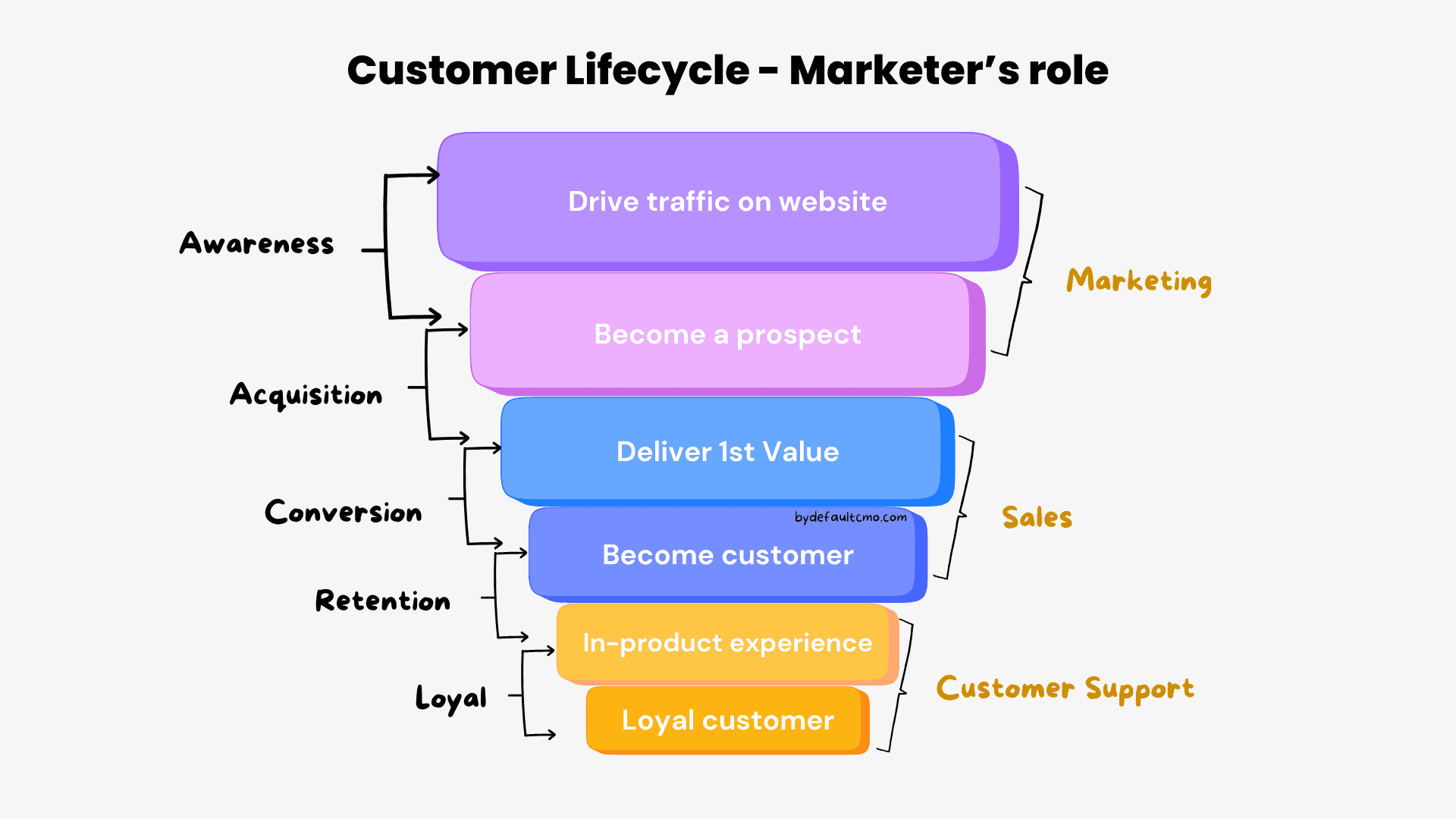
Brand style audit
You wouldn’t want to present an unprepared or half-done UI/UX to the prospects. You also don’t need to wait until everything is perfectly done but make sure your brand has a theme, colour scheme and brand image which makes it different then your competitor and at the same time your customers remember you.
Is there a brand style guide - any material, videos, presentation or assets?
Is the website design attractive and looks better for the customer experience? Is it also responsive?
Is the company story relevant to the brand?
Does it have a clear brand voice list and value that talks about the target customer?
Is the brand image easy to remember and recognised in the buyer's eyes?
Does the brand require redesigning or rebranding?
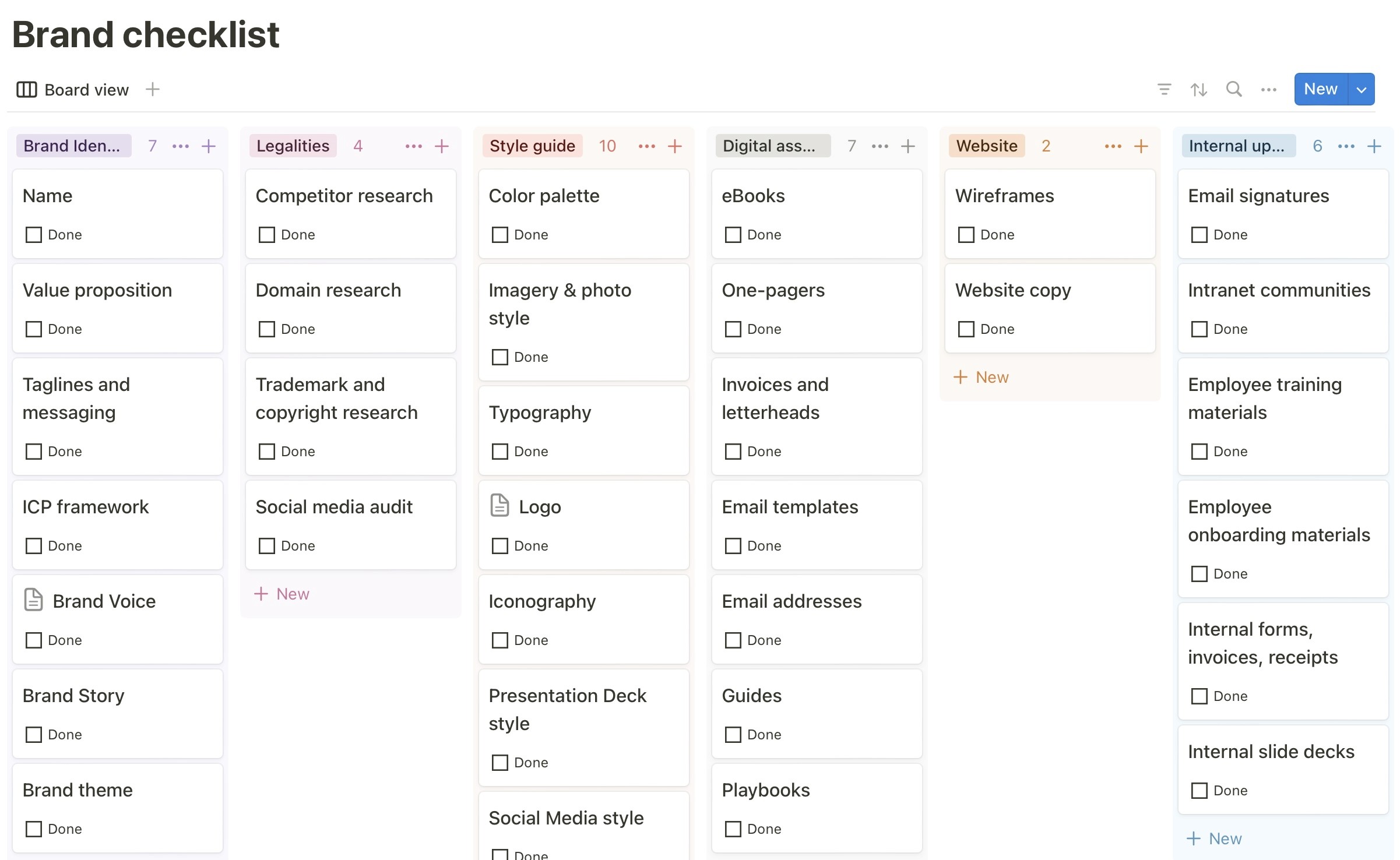
Product Marketing
Ideally, it’s the foundation of your marketing and if you haven’t done product marketing yet, you might be getting the strategy wrong. How you position your product and how you communicate it with your prospect, the context you discover under it goes to your landing page, blog post, content creation, ads and much more.
So before you even consider going for GTM or growth marketing, it’s better to be clear where you stand with product marketing.
Who is the Ideal customer profile (ICP) - who it’s for?
What is the pricing strategy? What is the average revenue per unit, cost per customer (CPC), etc.?
What is the positioning statement? Is the positioning different for each target customer?
Is the messaging aligned with what needs to be communicated?
Are there any industry forecasts, trends or future opportunities for the next 5 years?
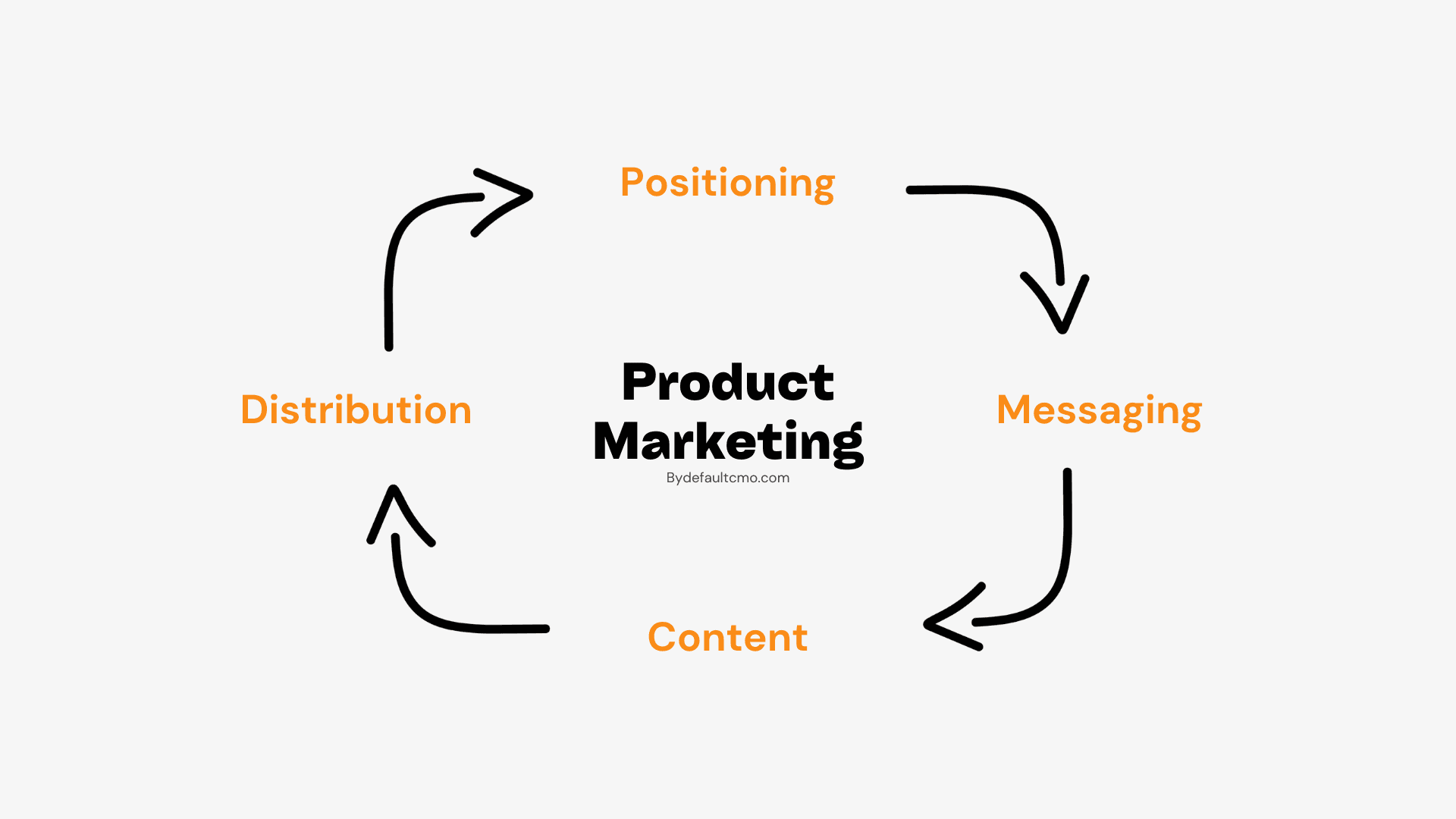
Website
Understand how your website is performing, as it’s the face of your product.
How has the traffic changed over the quarter or years?
Has the online presence grown or shrunk over time?
How does the website drive traffic? What are the most visited pages?
What does the SEO and domain score look like? Does it have a strong foundation?
How are visitors engaging within the website? What links are they clicking? Are all the tracking codes installed on the website? Does the website have clear CTAs (call to action)?
Is the website generating leads?
Is the company website up-to-date? Does it have all the required pages?
Is the company website responsive? Is it optimized to fit all screen sizes including tablets and phones? Does it work across different browsers?
Does the website have an updated pricing plan and service/product package?
Does the landing page convey clear messaging and a story about the product? Does the landing page have healthy conversion?
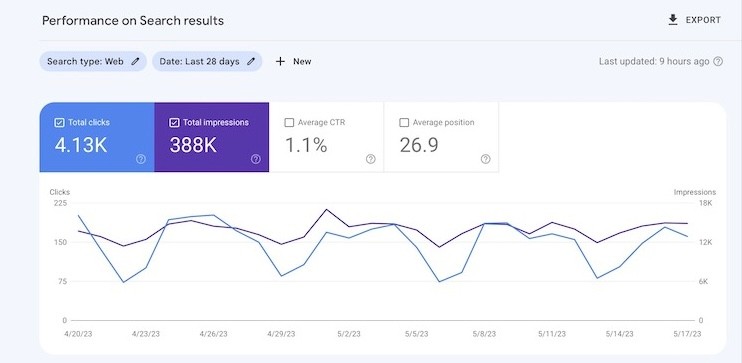
Content strategy & distribution audit
The main objective of conducting the content audit is to clearly understand whether we can communicate the product effectively and whether the content created converts traffic into customers. You don’t need to create content just to fill the calendar.
What’s the keyword strategy, what are the current ranking keywords and list of keywords you want to rank for?
What are the content pillars? What does the content calendar look like?
Is there any social media campaign running and what does the content on social media look like? What does the engagement on each social media platform look like?
What do the email campaigns, marketing and newsletter look like, what is the workflow - % of click rate, open rate, subscriber rate and engagement rate?
What is the current content strategy? How do you cover PR, blogs, guides, case studies, social media, automation, sales and event support, product marketing and channel marketing?
Product-market fit
Have we reached to product-market fit yet? In which market category?
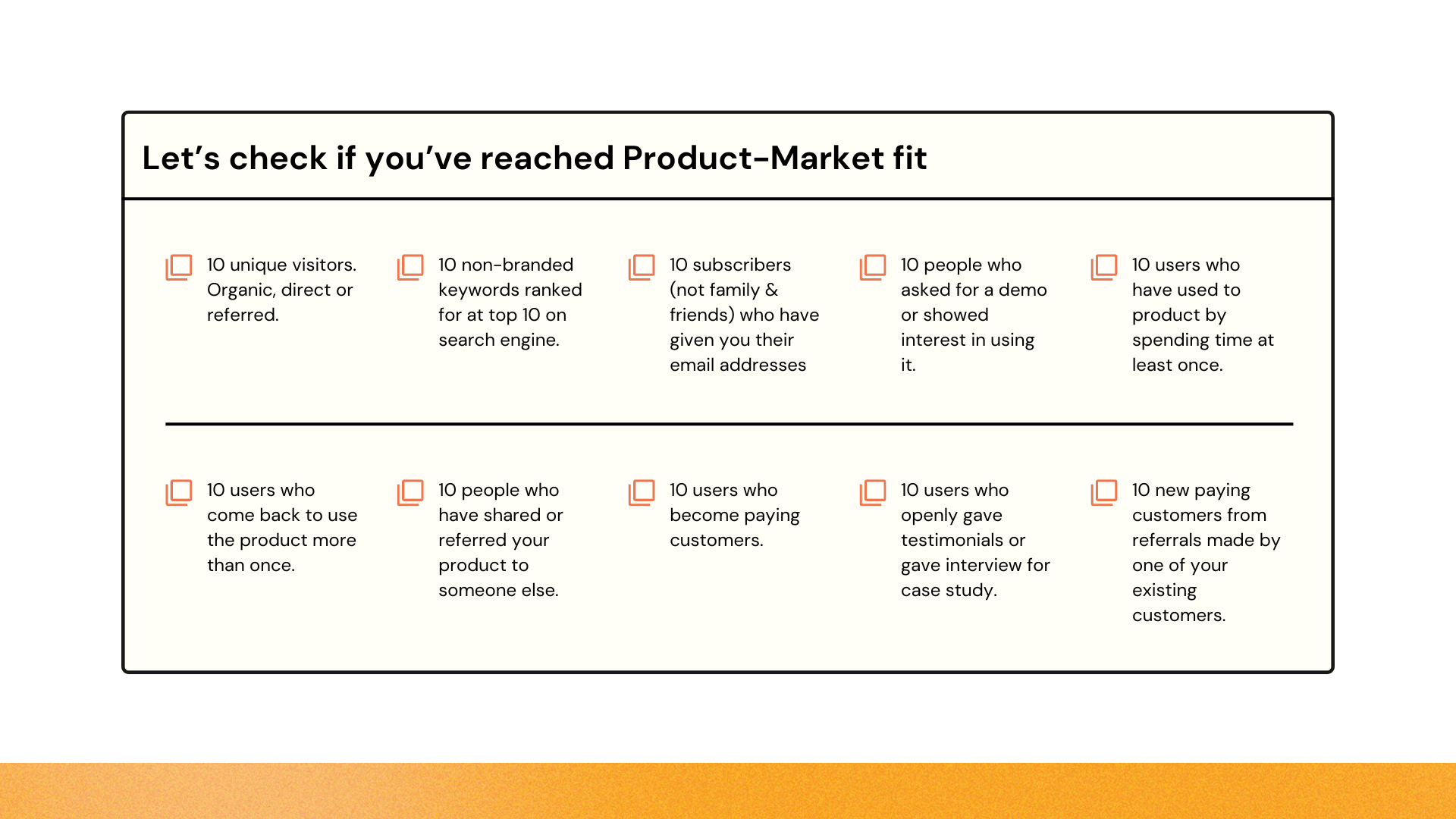
Strategies & others
What is the long-term and short-term strategy?
What does the marketing plan look like for the quarter or year? What’s going well according to plan, and where can you do better?
What is the budget and does it satisfy the investment made in marketing?
How do the campaigns have performed throughout the year?
Have you set clear OKRs and goals?
Is there any partnership plan or referral program? How effective they are? How many deals they have generated till now?
What tools do you use to support the marketing stack?
What does the customer support look like?
What outcome to expect after a marketing audit?
Once you’re done with auditing the product & marketing strategy, you’ll be able to make clear business decisions that might have not been easy in the past.
What’s working and what isn’t?
Clear focus and strengths on go-to-market strategy.
Get the internal team on the same mentality - how everyone views customers and products.
Established and more realistic goals.
The idea around where to allocate a marketing budget
To ensure the streamlined complex needs of each customer segment.
Fill the gap between product and marketing
Able to redirect marketing to be more aligned with business goals
Messaging that communicates the product effectively to customers through content.
A website that drives traffic and converts.

